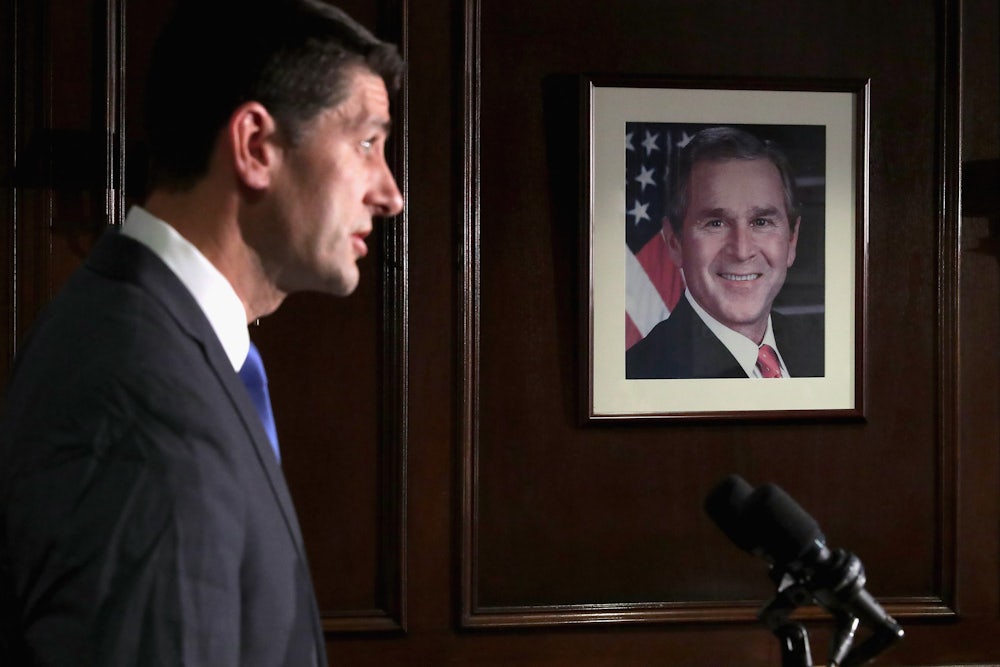House Speaker Paul Ryan either has a fox’s IQ, or a fox’s instinct for self-preservation. But you’re giving him too much credit if you think he’s clever like one.
For many days, thanks largely to the panicked whispers of donor-class Republicans, speculation has swirled that Republican delegates at a contested convention would deny both Donald Trump and Ted Cruz the GOP’s presidential nomination and bestow it upon Ryan instead. By refusing to disavow the idea resolutely, and by inserting himself rather conspicuously into his party’s primary on multiple occasions, Ryan—intentionally or otherwise—fed the impression that the speculation had merit.
That was the state of play in Republican politics until Tuesday, when Ryan took himself out of contention without hedging.
“Let me be clear. I do not want, nor will I accept the nomination for our party,” he said at a press conference at Republican National Committee headquarters on Capitol Hill. “If no candidate has a majority on the first ballot, I believe that you should only choose from a person who has actually participated in the primary. Count me out.”
A demurral this categorical would normally put an end to the buzz, but Ryan has a unique history. In the antiquity of six months ago, Ryan insisted he would “not be a candidate” for House speaker, before grudgingly (or perhaps “grudgingly”) accepting the assignment a few days later. To many ears, Ryan’s latest statement contains an implicit omission: I do not want, nor will I accept the nomination for our party … but you can quite easily force it on me, as you know from recent experience.
For the press to interpret his denial as genuinely Shermanesque, Ryan would have had to say something more like, “I shall not seek the nomination, will not accept it, and if it is thrust upon me, I shall commit seppuku.” Instead, many seasoned analysts believe this is merely a feint, and that in the event of a deadlocked convention, he would relent reluctantly (“reluctantly”) again.
Of course he would. https://t.co/K663J8h1NA
— Ryan Lizza (@RyanLizza) April 12, 2016
Does anyone really believe that Ryan will be all "new phone who dis" if the GOP comes calling this summer?
— Jamelle Bouie (@jbouie) April 12, 2016
Maybe this is the correct read on Ryan’s thinking. Maybe his speakership reversal is the proper parallel. But Ryan wasn’t lying when he said the circumstances under which he became speaker, and those under which he could become the presidential nominee, are “apples and oranges.”
How so? The procedural dissimilarities between a Speakership election and a nominating convention are vast. But they’re dwarfed by the differences between swapping a House chairmanship for the House speakership on the one hand, and serving simultaneously as House Speaker and GOP presidential nominee on the other. The former entailed a relatively smooth transition. The latter would be an unimaginable clusterfuck.
Ryan could only wear both hats if, with the presidential nomination secured, he could turn his attention to the general election after the convention, and govern the House by consensus for a few months to demonstrate his conciliatory bona fides.
But...nope.
As Speaker of the House, Ryan would still hold a constitutional office and continue to bear its obligations. Thus, by September 30, he would need to fund the government, and would have to do so on a bipartisan basis. This has become a famously difficult undertaking for Republican leaders over the past five years. Under normal circumstances, conservatives might begrudgingly allow the government to be funded temporarily, without any brinkmanship, to avoid an election-eve shutdown. But if Ryan becomes the GOP nominee, he will have effectively stolen the primary election from Donald Trump and Ted Cruz, one or both of whom might lead a campaign to depose yet another quisling House Speaker—except this one would just so happen to be the GOP’s presidential nominee.
Perhaps Ryan would anticipate the chaos and relinquish the Speakership in July, but he would then be consigning himself to launch his presidential candidacy amid a leadership vacuum in the House with a government shutdown deadline looming. And it would be incumbent upon him to endorse a successor. Would he back House Majority Leader Kevin “The Benghazi Committee Was a Ruse” McCarthy? House Majority Whip Steve “I’m David Duke Without the Baggage” Scalise? Whatever discord emerged from that process, Ryan would own it.
Consider that, by comparison to handing Ryan the nomination, handing it to Mitt Romney sounds almost reasonable. Romney is retired, old, rich, knows how to run for president from beginning to end, has little left to lose, and is already identified as a leader of the anti-Trump movement. And yet who of any stature in the Republican Party believes that nominating the loser of the last election is a good idea? Not only did Ryan lose that election, too, but he is currently the load bearing block in the GOP’s rickety Jenga tower.
It’s a safe bet that Ryan has thought past the Sorkinesque fantasies, all the way through to the genuine, and genuinely troublesome, implications of a last-minute anointment. If nothing else, he must know the risk it would pose to his career—a double-murder/suicide, when his path to continued power is otherwise completely unobstructed. If he accepts the nomination under any circumstances, he won’t have proven himself a wily operator. He will have revealed himself to be a madman.
To learn more about the 2016 elections, subscribe to our podcast Primary Concerns, hosted by Brian Beutler. You can listen to the latest episode here:
